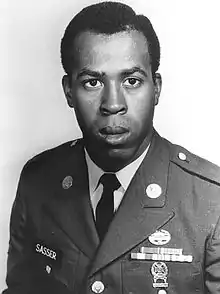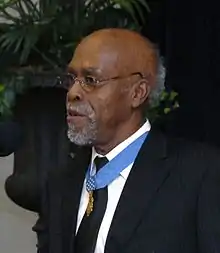Clarence Sasser
Clarence Eugene Sasser (born September 12, 1947) is a former United States Army soldier and a recipient of the United States military's highest decoration for valor, the Medal of Honor, for his actions in the Vietnam War.
Clarence Sasser | |
|---|---|
 | |
| Born | September 12, 1947 Chenango, Texas |
| Allegiance | United States |
| Service/ | United States Army |
| Years of service | 1967–1968 |
| Rank | Specialist Five |
| Unit | 60th Infantry Regiment |
| Battles/wars | Vietnam War |
| Awards | Medal of Honor Purple Heart |
Early life and Vietnam War
Born in Chenango, Texas, Sasser briefly attended the University of Houston as a chemistry major but was forced to drop out due to lack of funds. He was drafted into the United States Army after giving up his college deferment and served as a combat medic during the Vietnam War.[1] Sasser's Vietnam War tour lasted just 51 days. He received the Medal of Honor from President Richard Nixon in 1969 for his actions on January 10, 1968, in Dinh Tuong Province, South Vietnam. A member of Headquarters and Headquarters Company, 3rd Battalion, 60th Infantry Regiment, 9th Infantry Division, he was a private first class attached to the 3rd Battalion's Company A when he earned the medal and was later promoted to specialist five.
Civilian life
When his military commitment was finished, Sasser enrolled at Texas A&M University as a chemistry student. He then worked at an oil refinery for more than five years before being employed by the United States Department of Veterans Affairs.[2][3]
A statue depicting Sasser in the war was created in 2010 and which was placed in front of the Brazoria County Courthouse at that time.[4]
Medal of Honor

Official citation:
For conspicuous gallantry and intrepidity in action at the risk of his life above and beyond the call of duty. Specialist 5th Class Sasser distinguished himself while assigned to Headquarters and Headquarters Company, 3d Battalion. He was serving as a medical aidman with Company A, 3d Battalion, on a reconnaissance in force operation. His company was making an air assault when suddenly it was taken under heavy small arms, recoilless rifle, machinegun and rocket fire from well fortified enemy positions on three sides of the landing zone. During the first few minutes, over 30 casualties were sustained. Without hesitation, Specialist 5th Class Sasser ran across an open rice paddy through a hail of fire to assist the wounded. After helping one man to safety, he was painfully wounded in the left shoulder by fragments of an exploding rocket. Refusing medical attention, he ran through a barrage of rocket and automatic weapons fire to aid casualties of the initial attack and, after giving them urgently needed treatment, continued to search for other wounded. Despite two additional wounds immobilizing his legs, he dragged himself through the mud toward another soldier 100 meters away. Although in agonizing pain and faint from loss of blood, Specialist 5th Class Sasser reached the man, treated him, and proceeded on to encourage another group of soldiers to crawl 200 meters to relative safety. There he attended their wounds for five hours until they were evacuated. Specialist 5th Class Sasser's extraordinary heroism is in keeping with the highest traditions of the military service and reflects great credit upon himself, his unit, and the U.S. Army.
See also
References
- "Oral History Interview with SP5 Clarence E. Sasser". Army Medical Department Regiment. Retrieved August 12, 2013.
- "SPECIALIST 5th CLASS CLARENCE EUGENE SASSER". Rootsweb. Retrieved May 23, 2013.
- Smith, Larry Earl (2003). Beyond Glory: Medal of Honor Heroes in Their Own Words. W. W. Norton & Company. p. 331. ISBN 9780393051346. Retrieved May 28, 2013.
Clarence Sasser texas A&M.
- Zavalla, Judy (November 17, 2010). "Medal of Honor Recipient". Alvin Sun-Advertiser. Alvin, Texas. Archived from the original on October 9, 2020.
- "Clarence Sasser, Medal of Honor recipient". Stories of Valor. Public Broadcasting System. Retrieved December 7, 2007.
- "Congressional Medal of Honor". Clarence Eugene Sasser. African American Involvement in the Vietnam War. Retrieved December 7, 2007.
External links
- "Article on Sasser, with photographs". Retrieved September 24, 2010.